凤凰职教第三册unit2
- 格式:doc
- 大小:139.50 KB
- 文档页数:17
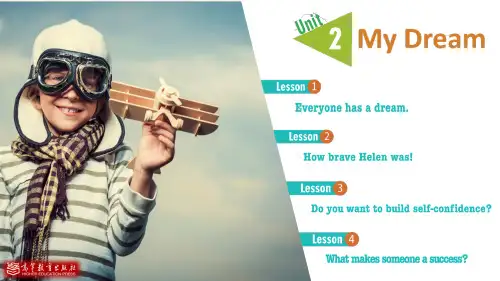
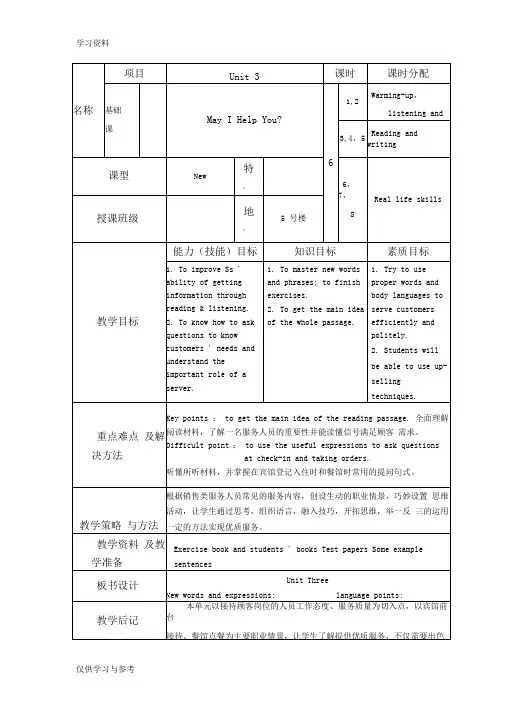
I'll ring the hotel. I'll tell them we'll check in tomorrow... 我来给旅馆打电话,通知他们我们明天入住。
→ Check out 结账离开,结账退房They packed and checked out of the hotel. 他们收拾好东西,办理了退房手续。
I was disappointed to miss Bryan, who had just checked out...我非常失望没有见着布赖恩,他刚退房走了。
→ Reservation[?rez?'ve ??n] n. 预定,预约He went to the desk to make a reservation... 他到服务台进行了预订。
Do you have a reservation? 你有预定吗?→ manage ['m? n?d?] vt. 管理,经营Mr. Smith manages a large department store. 史密斯先生经营一家大型百货公司。
→ manage to do sth 经过努力克服困难,设法做成某事Given a chance, I will manage to do the work well. 如果给我机会,我会设法做好这项工作。
Unit Three 第二课时(在餐馆) Listening &Speaking BStep Two:L isteningActivity1 :Look at the picture. What did the customer order? Tick ( √) from the list. Activity 2:Extensive listening Listen to the conversationa nd circle the correct answers..Activity 3:Intensive Listening Listen again and complete the order sheet for the waitress.Step Three : Arrangement Arrange the sentenceb elowto make a conversation between customer and a waiter in a coffee shop. Waiter: Are you ready to order sir?Customer: Yes, please.' dI like a cup of coffee. Waiter: Cream and sugar? Customer: Just blac'sk fine. Waiter: Anything else, sir? Customer: And a piece of toas Waiter: Certainly, sir. Coming right up.Customer: Thank you. StepFour : Role-playRead the menu. Then work wit your partner to turns to order and take the order.观察图片,判断客人点 的实物名称,做出正确 选择。
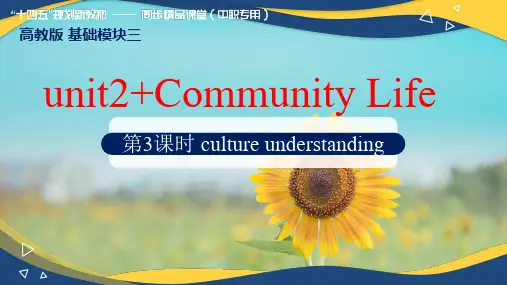
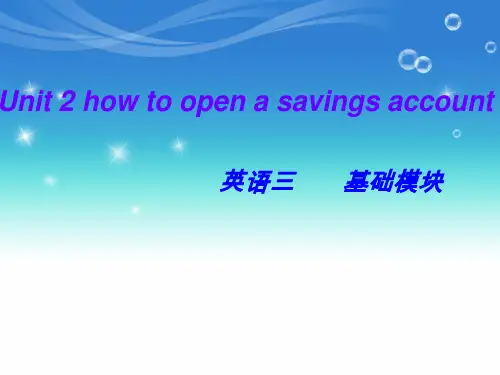
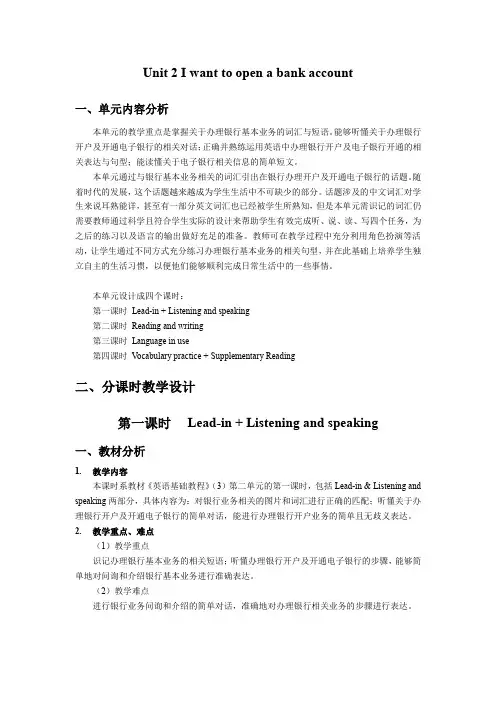
Unit 2 I want to open a bank account一、单元内容分析本单元的教学重点是掌握关于办理银行基本业务的词汇与短语。
能够听懂关于办理银行开户及开通电子银行的相关对话;正确并熟练运用英语中办理银行开户及电子银行开通的相关表达与句型;能读懂关于电子银行相关信息的简单短文。
本单元通过与银行基本业务相关的词汇引出在银行办理开户及开通电子银行的话题。
随着时代的发展,这个话题越来越成为学生生活中不可缺少的部分。
话题涉及的中文词汇对学生来说耳熟能详,甚至有一部分英文词汇也已经被学生所熟知,但是本单元需识记的词汇仍需要教师通过科学且符合学生实际的设计来帮助学生有效完成听、说、读、写四个任务,为之后的练习以及语言的输出做好充足的准备。
教师可在教学过程中充分利用角色扮演等活动,让学生通过不同方式充分练习办理银行基本业务的相关句型,并在此基础上培养学生独立自主的生活习惯,以便他们能够顺利完成日常生活中的一些事情。
本单元设计成四个课时:第一课时Lead-in + Listening and speaking第二课时Reading and writing第三课时Language in use第四课时V ocabulary practice + Supplementary Reading二、分课时教学设计第一课时Lead-in + Listening and speaking一、教材分析1.教学内容本课时系教材《英语基础教程》(3)第二单元的第一课时,包括Lead-in & Listening and speaking两部分,具体内容为:对银行业务相关的图片和词汇进行正确的匹配;听懂关于办理银行开户及开通电子银行的简单对话,能进行办理银行开户业务的简单且无歧义表达。
2.教学重点、难点(1)教学重点识记办理银行基本业务的相关短语;听懂办理银行开户及开通电子银行的步骤,能够简单地对问询和介绍银行基本业务进行准确表达。
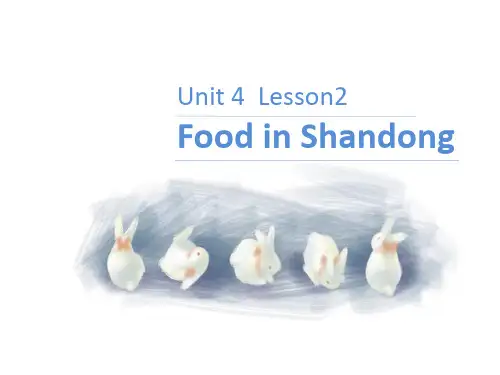
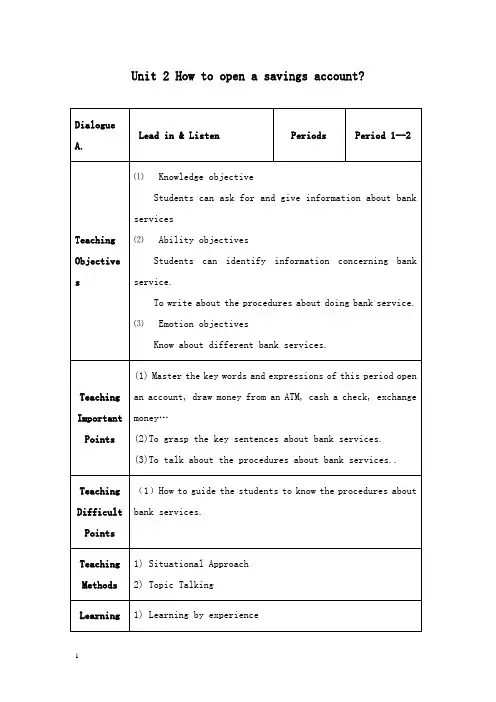
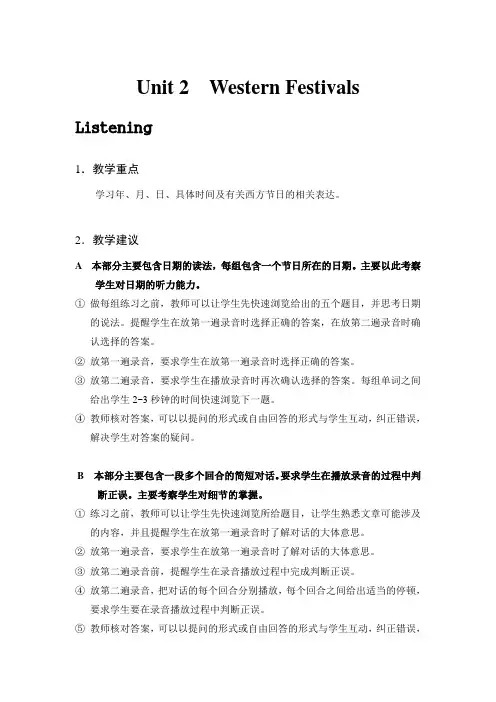
Unit 2 Western Festivals Listening1.教学重点学习年、月、日、具体时间及有关西方节日的相关表达。
2.教学建议A 本部分主要包含日期的读法,每组包含一个节日所在的日期。
主要以此考察学生对日期的听力能力。
①做每组练习之前,教师可以让学生先快速浏览给出的五个题目,并思考日期的说法。
提醒学生在放第一遍录音时选择正确的答案,在放第二遍录音时确认选择的答案。
②放第一遍录音,要求学生在放第一遍录音时选择正确的答案。
③放第二遍录音,要求学生在播放录音时再次确认选择的答案。
每组单词之间给出学生2~3秒钟的时间快速浏览下一题。
④教师核对答案,可以以提问的形式或自由回答的形式与学生互动,纠正错误,解决学生对答案的疑问。
B 本部分主要包含一段多个回合的简短对话。
要求学生在播放录音的过程中判断正误。
主要考察学生对细节的掌握。
①练习之前,教师可以让学生先快速浏览所给题目,让学生熟悉文章可能涉及的内容,并且提醒学生在放第一遍录音时了解对话的大体意思。
②放第一遍录音,要求学生在放第一遍录音时了解对话的大体意思。
③放第二遍录音前,提醒学生在录音播放过程中完成判断正误。
④放第二遍录音,把对话的每个回合分别播放,每个回合之间给出适当的停顿,要求学生要在录音播放过程中判断正误。
⑤教师核对答案,可以以提问的形式或自由回答的形式与学生互动,纠正错误,解决学生对答案的疑问。
⑥最后将整篇对话录音播放一遍,解决学生对答案的疑问,纠正错误。
C 本部分主要包含五个句子的听写,主要考察学生对整句话的理解以及快速拼写的能力。
①做练习之前,教师可以提醒学生在放第一遍录音时了解每句话的大体意思。
放第一遍录音,要求学生在放第一遍录音时了解句子的意思,并且记录句中的关键词汇和短语。
②放第二遍录音前,提醒学生要在录音播放过程中记录下连贯的句子。
③放第二遍录音,要求学生在录音播放过程中记录下连贯的句子,每句之间给出5~10秒的时间整理答案。
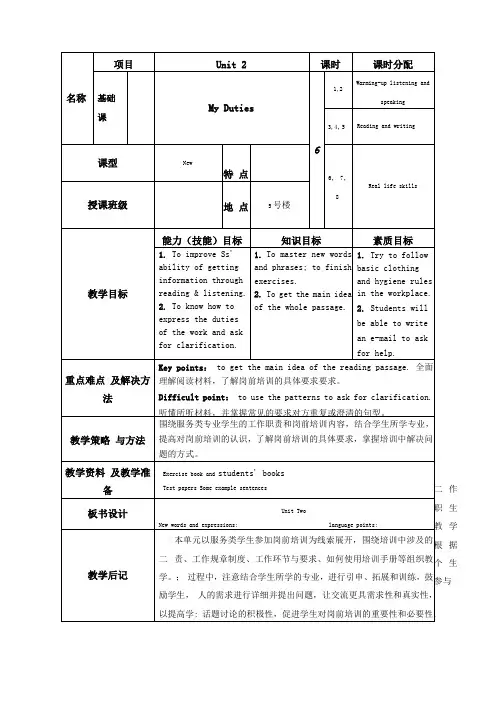
作生学据生★In that case, there is nothing you can do than wait.A. moreB. otherC. betterD. any答案为B。
一、"other than” 的含义1.other than = except, but, apart from ”除........ 以夕卜”There is nobody here other than me.这里除了我以外没有别人。
Someone other than your brother should be appointed manager.应当任命一个除了兄弟之外的人当经理。
2.other than = besides ”除.. 以外,还... ”English is now spoken in many countries other than England. 除英国夕卜,其他许多国家都讲英语。
There were three people at the meeting other than Mr Day.除戴先生以夕卜,还有三个人参加了会议。
3.other than = not, instead of, rather than ”不、非、而不是”I borrowed some books other than novels. 我借了几本书,都不是小说书。
4.other than = in any other way than ”用除此以外别的方式”You can’t get there other than by sW除了璇过去之外,你没有别的方法到达那儿。
二、"other than” 的结构1.other than + 名词/代词The presence of elements other than iron greatly affects the physical properties of steel. 铁以外的其他元素的存在极大地影响着钢的性能。
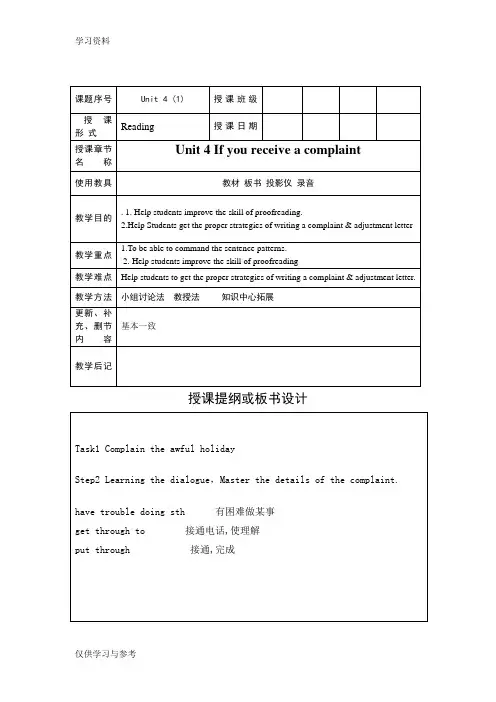
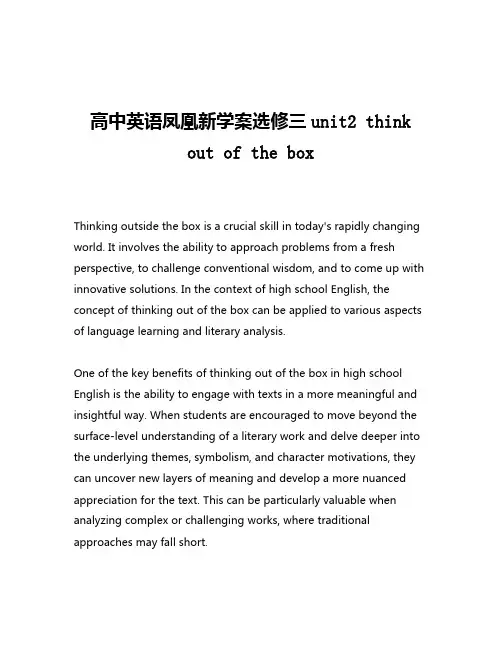
高中英语凤凰新学案选修三unit2 thinkout of the boxThinking outside the box is a crucial skill in today's rapidly changing world. It involves the ability to approach problems from a fresh perspective, to challenge conventional wisdom, and to come up with innovative solutions. In the context of high school English, the concept of thinking out of the box can be applied to various aspects of language learning and literary analysis.One of the key benefits of thinking out of the box in high school English is the ability to engage with texts in a more meaningful and insightful way. When students are encouraged to move beyond the surface-level understanding of a literary work and delve deeper into the underlying themes, symbolism, and character motivations, they can uncover new layers of meaning and develop a more nuanced appreciation for the text. This can be particularly valuable when analyzing complex or challenging works, where traditional approaches may fall short.For example, in a unit on Shakespeare's "Hamlet," students could be challenged to think beyond the conventional interpretations of the play and explore alternative perspectives. Instead of simply analyzing the protagonist's internal struggle and the political intrigue of the Danish court, they could consider the play's broader commentary on the nature of existence, the role of fate and free will, or the significance of the supernatural elements. By approaching the text with a more open and creative mindset, students can develop a deeper understanding of the play's themes and their relevance to the human experience.Similarly, in a unit on modern poetry, students could be encouraged to think outside the box when interpreting the work of poets like T.S. Eliot or Sylvia Plath. Rather than solely focusing on the technical aspects of the poems, such as rhyme, meter, and imagery, they could explore the emotional and psychological dimensions of the texts, considering how the poets' personal experiences and worldviews are reflected in their writing. This type of analysis not only enhances the students' understanding of the poems but also helps them develop empathy and critical thinking skills.Thinking out of the box can also be valuable in the context of language learning. When students are encouraged to experiment with new vocabulary, sentence structures, and modes of expression, they can become more confident and creative communicators. Forinstance, in a unit on persuasive writing, students could be challenged to craft arguments that go beyond the traditional "pro-con" format and incorporate more innovative rhetorical strategies, such as using metaphor, storytelling, or unexpected analogies to convey their message.Furthermore, thinking out of the box can be beneficial in the realm of English language assessment. Instead of relying solely on traditional formats like multiple-choice tests or essays, educators can incorporate more creative and open-ended assessment methods, such as project-based learning, oral presentations, or multimedia projects. These alternative assessment strategies not only provide a more well-rounded evaluation of the students' skills but also encourage them to think creatively and apply their knowledge in practical, real-world contexts.It is important to note that while thinking out of the box is a valuable skill, it should not be viewed as a replacement for mastering the fundamental aspects of high school English. Students still need to develop a solid foundation in grammar, vocabulary, and literary analysis, as these skills form the building blocks for more advanced and creative thinking. The goal should be to strike a balance between traditional learning and innovative approaches, allowing students to develop both the technical proficiency and the creative problem-solving abilities that are essential for success in today'srapidly evolving world.In conclusion, the concept of thinking out of the box is a crucial component of high school English education. By encouraging students to approach texts, language, and assessment with a more open and creative mindset, educators can foster the development of critical thinking, problem-solving, and communication skills that are highly valued in academia and the workforce. As students navigate the complexities of the 21st century, the ability to think outside the box will become increasingly important, and high school English programs can play a vital role in nurturing this essential skill.。
凤凰职教第三册英语期中考试试卷江苏联合职业技术学院苏州建设交通分院苏州建设交通高等职业技术学校2013 ~2014学年第二学期《英语》课程12级期中考试试卷班级学号姓名成绩一、单项填空(共20小题;每小题1分,满分20分)1.As a general rule, students are _________to attend classes during weekdays.A. askB. requiredC. needD. requiring2. He finds _________ necessary to carry a first-aid kit when going hiking.A. thatB. thisC. /D. it3. Excuse me, would you mind ___________ next to you?A. my sittingB. I sitC. me sitD. to sit4. When having an interview, don’t let your hair ________ your face.A. fall onB. fall toC. fall downD. fall5. She suggested _________ at 4:00 a.m. so that we can enjoythe sunrise.A. get upB. to getting upC. to get upD. getting up6. The house you bought looks so shabby and it requires _________ thoroughly.A. repaintB. repaintingC. to repaintD. to be repainting7. A mailman’s duty is ___________ letters and parcels every morning.A. deliverB. to deliverC. passD. to pass8. Most animals can ________ themselves _______ their environment.A. adjust, withB. adjust, toC. adjustment, withD. adjustment, to9. Miss Yang asked two students to _________ the exam papers round the class.A. sendB. distributeC. give awayD. give up10. To keep our country safe, we must ________ the army forthe modern war.A. putB. makeC. equipD. produce11. Since you are so tired, you should _________ a few days __________.A. take, offB. give, offC. spend, offD. get, off12. For further details, please __________ page 125 in the Employee Manual.A. look upB. refer toC. look atD. look for13. Mary has much free time. _________ she does every day is just to give two piano lessons.A. ThatB. WhatC. WhichD. When14. The boy threw a stone at me. I jumped back in time to avoid __________.A. hitB. hittingC. being hitD. to hit15. Most customers tend to go back to those shops ___ theyreceived friendly, efficient service.A. whereB. whichC. thatD. on which16. Be sure to call me tomorrow morning, ___________?A. will youB. aren’t youC. can youD. mustn’t17. The student will leave school. I ________ them a very happy future.A. hopeB. WantC. expectD. wish18. We have decided to _________ his apartment and leave a message if he’s not t here.A. call onB. call forC. call inD. call at19. Sometimes, life can be very difficult ___________.A. to copeB. to cope withC. copingD. coping with20. She is dressed in the ___________ Paris Fashion.A. lateB. laterC. latestD. lates二、完形填空(共10小题;每小题1分,满分10分)There are many words in the English language. You will never 1 the meaning of every word in English. When you read, you will often find many 2 you do not know. You will not have enough time to 3 reading and try to find every new word in a dictionary.Sometimes you can 4 a new word because you know some of the parts of the new word. For example, if a word ends 5 the letters “er”, that word 6 be the name of a 7 or a thing that does a certain action(某个动作). A writer is a person who writes. 8 it is not 9 to know the parts of a new word to understand it, 10 it will help you many times.1、A.know B.learn C.find D.look up2、A.books B.letters C.stories D.words3、A.stop B.enjoy C.keep D.start4、A.find B.get C.study D.guess5、A.in B.off C.up D.by6、A.can B.might C.should D.must7、A.friend B.boy C.person D.girl8、A.Then B.Now C.Yet D.Sometimes9、A.helpful B.useful C.enough D.good10、A.but B.and C.so D.for三、阅读理解(共15小题;每小题2分,满分30分)(A)As July comes, examinations are near; but these are soon finished and with them ends the school year. Boys and girls have nearly two months’holiday for them to spend as they leave school by train or car to return home to meet their fathers and mothers.The summer holidays are the best part of the year for most children. The weather is usually good, so that one can spend most of his time playing in the garden or, if one lives in a big town, he can usually go to a park to play.The best place for a summer holiday, however, is the seaside. Some children are lucky enough to live near the sea, but for others who do not, a week or two at one of the big seaside towns is something that they will talk about for the whole of the following year.Now, what is it that children like so much about the seaside?I think it is the sand, the sea and the sun more than any other things. Of course, there are lots of new things to see, nice things to eat, and exciting things to do, but it is the feeling of sand under one’s feet, of salt water on one’s skin, and of the warm sun on one’s back that make the seaside what it is.1. Summer holidays start _________.A. with JulyB. as soon as the examinations are overC. in mid-JulyD. in August2. After the examinations, all pupils leave for home _________.A. by train onlyB. by airC. by bikeD. by either train or car3. The summer holidays last _________.A. as long as two monthsB. more than two monthsC. one and a half monthsD. a little less than two months4. Children like the seaside so much because they can _________.A. catch a lot of fish and make some moneyB. see their fathers and mothers fishingC. swim in the sea and play with the sandD. play all kinds of ball games5. _________ make the seaside what it is.A. Sand, salt water and warm sunshineB. New things to seeC. Nice things to eatD. Exciting things to do(B)One day, my wife and I went shopping at the store. We took the car as we had a lot of things to buy because my brother and his family were going to spend the holiday with us. We stopped the car in front of the store. An hour later we came back to the car. Both of us carried a lot of things. Then the trouble started. We could not open the car door.“Oh, my dear,” said my wife, “What are we going to do?”“Let’s ask that policeman for help,” I said.The policeman was very kind and was glad to help us. A few minutes later he got the car door open. Just at that moment an angry voice from behind shouted, “What are you doing with my car?”We looked at the number of the car, and our faces turned red.1. The husband and wife went shopping that day because _________.A. they wanted to have a big meal on holidayB. the wife’s brother and his family planned to spend the holiday with themC. they wanted to try their new car for the first timeD. the husband’s brother and his family would like to spe nd the holiday with them2. How long did it take them to buy all the things they needed?A. An hour.B. Less than an hour.C. Two hours.D. A little over half an hour.3. Who finally helped to open the car door?A. A policeman.B. The husband.C. The wife.D. The writer’s son.4. Who do you think shouted at the husband and the wife?A. The husband’s brother .B. The wife’s brother.C. Another policeman.D. The owner of the car.5. Why did their faces turn red when they heard the shouting?A. Because they could not open the door themselves.B. Because their car number was changed by someone.C. Because they found the car was not their own.D. Because they tried to steal the car.(C)Your body, which has close relations with the food you eat, is the most important thing you own, so it needs proper treatment and proper nourishment. The old saying “An apple a day keeps the doctor away”is not as silly as some people think. The body needs fruit and vegetables because they contain vitamin C. Manypeople take extra vitamins in pill form, believing that these will make them healthy. But a good diet is made up of nourishing food and this gives all the vitamins you need. The body doesn’t need or use extra vitamins, so why waste money on them?In the modern western world, many people are too busy to bother about eating properly. They throw anything into their stomachs, eating hurriedly and carelessly. The list of illnesses caused or made worse by bad eating habits is frightening.1. “Your body has close relations with the food you eat.”It means that_______.A. all kinds of food you eat can be made into your bodyB. your body is made up of the food you eatC. what you eat has great effect on your healthD. the more you eat, the fitter you will feel2. The old saying referred to in the passage tells us that _______ .A. eating apples regularly does lots of good to our healthB. the apple is the best among all kinds of fruitsC. apples can take the place of doctorsD. an apple is a sure cure for illness3. In the second paragraph, the writer tries to let us know_______.A. our bodies need food, or we can’t liveB. often eating apples is a good habitC. taking extra vitamin pills is completely uselessD, a good diet is of great importance for our health4. In the modern western countries ______.A. people don’t want to play more attention to their eatingB. a lot of people’s illnesses are caused or made worse by bad eating habitsC. people throw everything into their stomachs without chewingD. people are only too busy to cook meals for themselves5. From the passage, we can draw a conclusion that if we want to keep healthy, we should _________.A. only eat an apple a dayB. eat properlyC. take as many vitamin pills as possibleD. throw something into our stomachs slowly and carefully五、句子翻译(共5小题;每小题2分,满分10分)1. He likes playing football and so does his brother.2. Her behavior left a good impression on us.3. Be sure to look around when crossing the road.4. Don’t fall into the bad habit of smoking.5. I regretted telling Mary the bad news.六、书面表达(共1小题;满分20分)假如你即将成为一家餐厅的服务员,通过职前培训(induction training),你对自己的职业有了清晰的了解。
Unit2 My DutiesPeriod 1Warning up & listening & speaking ABTeaching aims:Knowledge and ability: students will be able to understand and express their duties and responsibilities.obtain key information during listening activity and use the useful expressions to talk about health and safety rules.Process and Method: Students will learn to be cooperative by group or pair work; use note-taking strategy and repetition strategy; and develop the communicative competence.Emotion, Attitude and Value: Students will be interested in this unit, build confidence in speaking English; consolidate their duties in future work;.Difficult points: To appreciate and understand the proverbs about duties and responsibilities and students can express their own opinions on the topics.Teaching contents: key words and phrasesTeaching proceduresStep1:Lead in : to arise the students’ interest by paying attention to the free questions.Free talkDo you know your duties now?Do you know your responsibilities now?Do you want to know the duties and responsibilities in future work? And how can you know the points?If you can’t answer the last question, let’s find the answer in this unit.Step 2Pre-task: To make the students curious about the duties of the different occupations.1. Read the four information, and try to give the occupation each piece of information.2. Match the information with the occupations.Cashier: He receives cash from customersReceptionist: He greets visitors and directs them to appropriate persons.Waiter: He serves food and drinks to customers.cook: He prepares food, using various cooking methods, i.e., boiling, roasting, baking.Step 3While-task:Listening:1. Extensive listening for main ideaWhich is true about the man?a. He was late for work today.b. He can’t follow what the woman says.c. He has difficulty in doing his tasks.2. Intensive listening for detailsresponsibility →response →responsiblebe responsible for3. Listen again and underline the sentences expressing lack of understanding.I beg your pardon, but what should I do before distributing the reports?Now, wait a second.Speaking:1. Read the expressions for fluency and accuracy.2. Use the expressions they’ve learned to ask for clarification.Grasp the drills of how to ask for clarification.I beg your pardon, but I don’t quite understand.What did you say?Please say again.Are you able to give an example of that point?Could you say that again, please?What?3. Work in pairsRearrange the useful expressions listed above according to polite/ formal, neutral, and least polite/ informal.Polite/ formal: I beg your pardon, but I don’t quite understand.Could you say that again, please?Neutral: Please say again.Are you able to give an example of that point?Least polite/ informal: What did you say? What?Step 4Post-task:Practise: use the useful expression to help you finish the following two situations.Your supervisor has assigned a task to you. But your don’t understand him well.You say:You’re talking with your partner to make a project plan,. You missed a few words he said. Step 5: homeworkRead and recite the conversation.Grasp the useful expressions and use them correctly.Period 2-3Teaching Aims:Knowledge & Ability:(1) The students will be able to understand the dialogue and improve their ability tograsp details in the listening material.(2) The students will be trained in their ability of relaying information.Process & Method:The students will be able to use the note-taking strategy and communicative strategy. Emotion, Attitude & Value:The students will have a positive attitude toward speaking, and will be willing to speak English. Difficult points:Introduce one trendy activity to the partner with the information in listening material. Teaching contents:Some health and safety rules to keep you and other people safe.Step 1Lead in: to introduce the topicAnswer the question:What should you pay attention to as a new employee?What’s the main idea of the tape?(A training course given to new employees.)Step 2:Pre-task:1. Skim over the options: to low the difficulties.2. Key words study :Thoroughly: do something completelyClean up : make… cleanAs soon as possible: as soon as sb. cane.g. Please come here as early as possible tomorrow.Can you give me as much money as possible?Make suree.g. Make sure you clean up as you work.Make sure that you close the door when leaving.Step 3While-task:Listening: To grasp the main idea and to train the ability of capturing details.1. Listen and tick the answer2. Listen and choose correct verbs to complete the rules.(Before listening, make the students read through the fillings.)Words given: leave wash heat report dry1). Wash your hands after you go to the toilet.2). Don’t leave rubbish around.3). Dry the floor, don’t leave it wet.4). Report damaged equipment as soon as possible.5). Heat cooked food to the right temperature.3. Listen again. What should people in the pictures do according to the health and safety rules? (make the students listening carefully and then read the pictures. Try their best to finish thesentences according to the pictures and the tape.)The woman should tie her hair up and wear a hat.The man should wash his hands.The man should dry the floor.Speaking: To train the ability of relaying information1. Teacher present the useful words and phrases as a hint for students2. Introduce one activity in the listening to the partner with the information in listening part. Step 4Post-task: To consolidate and expandSuppose you are manager of the Training Department of a newly opened restaurant. You are giving a speech to the waiters and waitresses. What instructions would you give them? Example: Always welcome customers with a smile.Try to give more after discussing.Make sure you clean up as you work.Be sure to have your pen ready, book open and pad ready.Ask the customer if they have any questions.Gather all information from each guest when taking the order.Identify customers according to position numbers.Always get the cooking temperature for meals.Step 5: homework1. Read the dialogues.2. Grasp the useful expressions and use them freely and correctly.3. Search for the related information of health and safety rules as much as possiblePeriod 4Teaching contents:Learn the new words and expressionsTeaching aims and demands :Enable the students to read the new words correctly and master the usages of them and use them correctly.Be familiar with some words related to computers.Teaching key points:The pronunciations and usages of the new words.Teaching difficult points:The same as the key points.Teaching methods:Reading. PracticingProcedure:Step1:free talkWhat do you do in your spare time?What’s your hobby?Does your family have a computer?How long do you surf the Internet every day?Can you tell us some words about Internet?Step2:giving the new1.Read the new words after me.2.Let them read for a while by themselves.3.Ask some to read and correct their mistakes.4.Read together and correct their mistakes.5.Explain some.beg: I beg your pardon? beg one’s pardon 请原谅,很抱歉Via I will go to Nantong via Rugao. Please send it via e-mail. Employee employ 雇佣employer 雇主replacereplace sth. with sth.I will replace the old desks with the new ones.: take the place ofThe new desks will take the place of the old ones.continue continue to do sth continue doing sthother than 除了Does anybody other than yourself know this?除你本人之外还有别人知道这事吗?She has no close friends other than him.除了他以外她没有好朋友。
★In that case, there is nothing you can do ______ than wait。
A。
more B。
other C。
better D。
any
答案为B。
一、“other than”的含义
1.other than = except, but, apart from “除……以外”
There is nobody here other than me. 这里除了我以外没有别人.
Someone other than your brother should be appointed manager。
应当任命一个除了兄
弟之外的人当经理。
2。
other than = besides “除……以外,还……”
English is now spoken in many countries other than England。
除英国外,其他许多国家
都讲英语。
There were three people at the meeting other than Mr Day. 除戴先生以外,还有三个人参加了会议.
3.other than = not,instead of,rather than “不、非、而不是”
I borrowed some books other than novels. 我借了几本书,都不是小说书。
4.other than = in any other way than “用除此以外别的方式”
You can't get there other than by swimming。
除了游过去之外,你没有别的方法到
达那儿。
二、“other than"的结构
1.other than + 名词/代词
The presence of elements other than iron greatly affects the physical properties of steel.
铁以外的其他元素的存在极大地影响着钢的性能。
You should get a little stifle ness but other than that there should be no side effects.
你会感到有点发闷,但除此之外不会再有副作用。
2.other than + 形容词
She can hardly be other than grateful. 她内心充满了感激之情。
I could not feel other than surprised。
我只是感到吃惊。
3.other than + 副词
She performed other than perfectly。
她的表演远非尽善尽美。
I could not do it other than hurriedly。
我只能匆匆忙忙地做了那件事。
4.other than + 介词短语
We decided not to stop anywhere other than at his house. 我们决定,除了他的房子以
外,任何地方都不停留。
You can't expect to get a pay rise other than with hard work。
只有努力工作你才能增加工资。
5.other than + 过去分词
The problem is other than settled。
问题还没有解决。
The struggle cannot be other than protracted。
这场斗争只能是持久的。
6.other than + 不定式
He reread every page with no other purpose than to pass the time。
他一页一页地重读,不为别的,只为消磨时间。
During the winter the hibernating animal can do nothing other than lie down and sleep。
在冬季,冬眠的动物只能躺下睡觉。
7.other than + 从句
She is other than I thought. 她和我想象的不一样。
I don’t wish her other than she is.我不希望她改变现状.
I can't be other than I am。
我只能是我。
The truth is quite other than what you think。
事实真相和你想的不一样。
8.other than的其他搭配
1)nothing other than “只是、仅仅”
They were given nothing other than dry bread and water for their evening meal。
他们只得到了干面包和水作晚餐。
2)no other than “正是、恰恰是”
It was no other than my best friend, Mary。
这不是别人,正是我最好的朋友玛丽。
3) no + 名词+ other than “正是……"
It was no other person than Mr Smith.那人正是史密斯先生。
4)none other than “不是别人/别的东西,正是……”
It was none other than Tom! We thought he was in Africa。
不是别人而正是汤姆!我们还
以为他在非洲呢!。